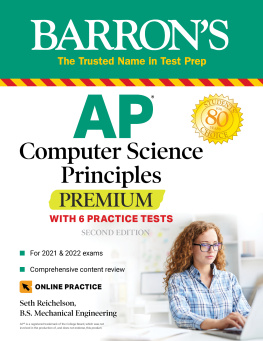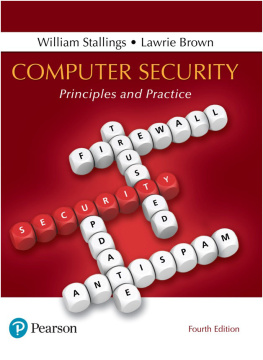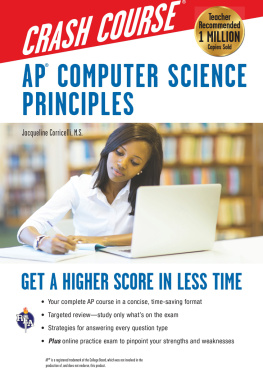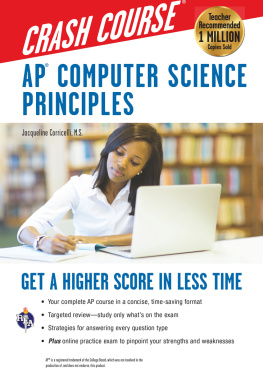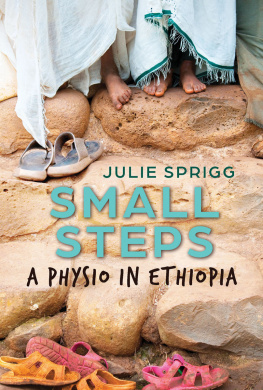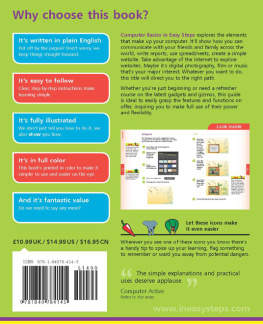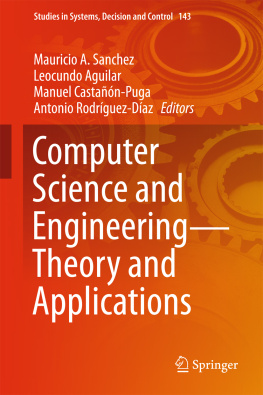Julie Sway - 5 Steps to a 5: AP Computer Science Principles 2018
Here you can read online Julie Sway - 5 Steps to a 5: AP Computer Science Principles 2018 full text of the book (entire story) in english for free. Download pdf and epub, get meaning, cover and reviews about this ebook. year: 2018, publisher: McGraw-Hill Education, genre: Children. Description of the work, (preface) as well as reviews are available. Best literature library LitArk.com created for fans of good reading and offers a wide selection of genres:
Romance novel
Science fiction
Adventure
Detective
Science
History
Home and family
Prose
Art
Politics
Computer
Non-fiction
Religion
Business
Children
Humor
Choose a favorite category and find really read worthwhile books. Enjoy immersion in the world of imagination, feel the emotions of the characters or learn something new for yourself, make an fascinating discovery.

- Book:5 Steps to a 5: AP Computer Science Principles 2018
- Author:
- Publisher:McGraw-Hill Education
- Genre:
- Year:2018
- Rating:5 / 5
- Favourites:Add to favourites
- Your mark:
- 100
- 1
- 2
- 3
- 4
- 5
5 Steps to a 5: AP Computer Science Principles 2018: summary, description and annotation
We offer to read an annotation, description, summary or preface (depends on what the author of the book "5 Steps to a 5: AP Computer Science Principles 2018" wrote himself). If you haven't found the necessary information about the book — write in the comments, we will try to find it.
Julie Sway: author's other books
Who wrote 5 Steps to a 5: AP Computer Science Principles 2018? Find out the surname, the name of the author of the book and a list of all author's works by series.
5 Steps to a 5: AP Computer Science Principles 2018 — read online for free the complete book (whole text) full work
Below is the text of the book, divided by pages. System saving the place of the last page read, allows you to conveniently read the book "5 Steps to a 5: AP Computer Science Principles 2018" online for free, without having to search again every time where you left off. Put a bookmark, and you can go to the page where you finished reading at any time.
Font size:
Interval:
Bookmark:
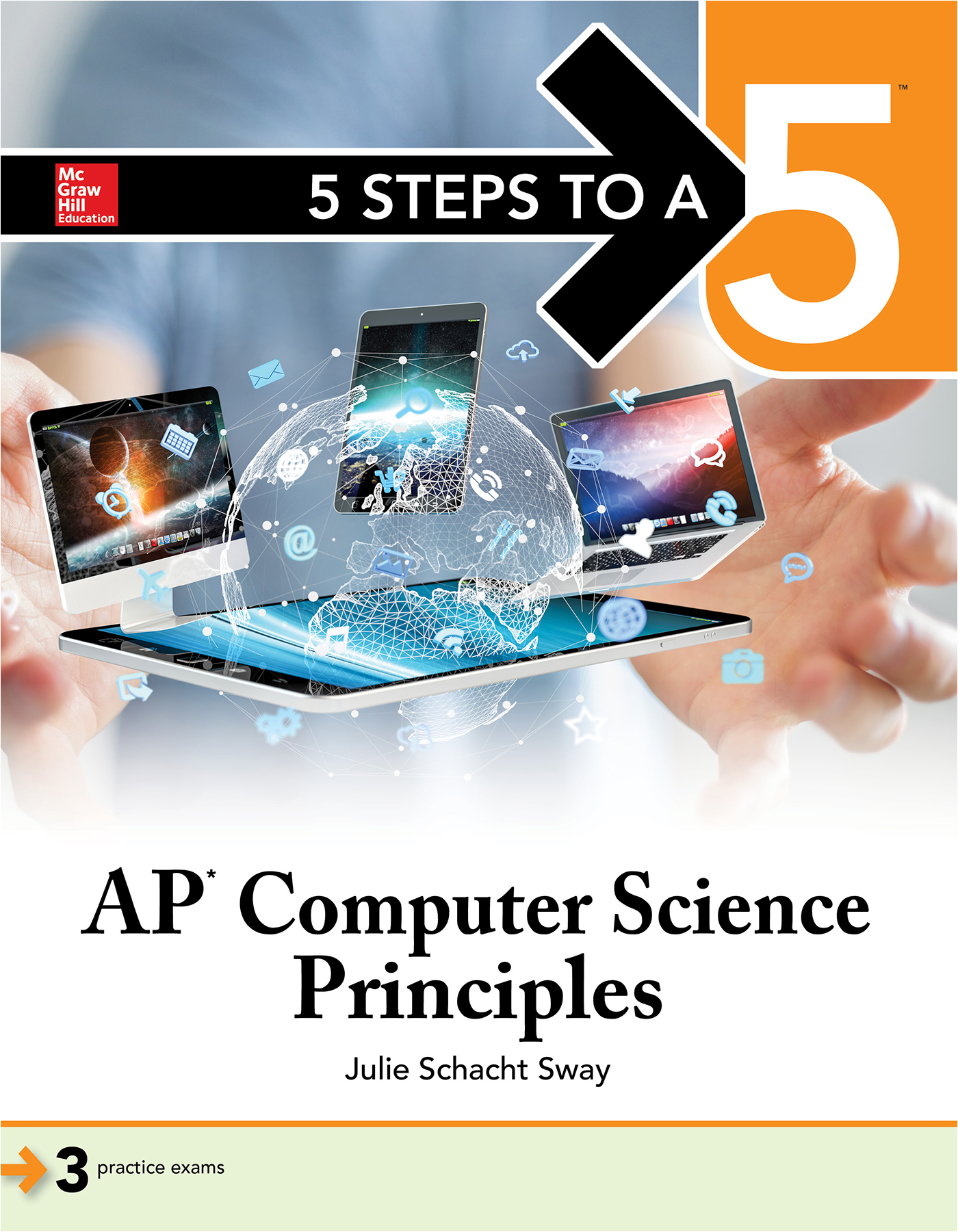

Copyright 2018 by McGraw-Hill Education. All rights reserved. Except as permitted under the United States Copyright Act of 1976, no part of this publication may be reproduced or distributed in any form or by any means, or stored in a database or retrieval system, without the prior written permission of the publisher.
ISBN: 978-1-26-002000-7
MHID: 1-26-002000-2
The material in this eBook also appears in the print version of this title: ISBN: 978-1-26-001999-5, MHID: 1-26-001999-3.
eBook conversion by codeMantra
Version 1.0
All trademarks are trademarks of their respective owners. Rather than put a trademark symbol after every occurrence of a trademarked name, we use names in an editorial fashion only, and to the benefit of the trademark owner, with no intention of infringement of the trademark. Where such designations appear in this book, they have been printed with initial caps.
McGraw-Hill Education eBooks are available at special quantity discounts to use as premiums and sales promotions or for use in corporate training programs. To contact a representative, please visit the Contact Us page at www.mhprofessional.com.
Trademarks: McGraw-Hill Education, the McGraw-Hill Education logo, 5 Steps to a 5, and related trade dress are trademarks or registered trademarks of McGraw-Hill Education and/or its affiliates in the United States and other countries and may not be used without written permission. All other trademarks are the property of their respective owners. McGraw-Hill Education is not associated with any product or vendor mentioned in this book.
AP, Advanced Placement Program, and College Board are registered trademarks of the College Board, which was not involved in the production of, and does not endorse, this product.
TERMS OF USE
This is a copyrighted work and McGraw-Hill Education and its licensors reserve all rights in and to the work. Use of this work is subject to these terms. Except as permitted under the Copyright Act of 1976 and the right to store and retrieve one copy of the work, you may not decompile, disassemble, reverse engineer, reproduce, modify, create derivative works based upon, transmit, distribute, disseminate, sell, publish or sublicense the work or any part of it without McGraw-Hill Educations prior consent. You may use the work for your own noncommercial and personal use; any other use of the work is strictly prohibited. Your right to use the work may be terminated if you fail to comply with these terms.
THE WORK IS PROVIDED AS IS. McGRAW-HILL EDUCATION AND ITS LICENSORS MAKE NO GUARANTEES OR WARRANTIES AS TO THE ACCURACY, ADEQUACY OR COMPLETENESS OF OR RESULTS TO BE OBTAINED FROM USING THE WORK, INCLUDING ANY INFORMATION THAT CAN BE ACCESSED THROUGH THE WORK VIA HYPERLINK OR OTHERWISE, AND EXPRESSLY DISCLAIM ANY WARRANTY, EXPRESS OR IMPLIED, INCLUDING BUT NOT LIMITED TO IMPLIED WARRANTIES OF MERCHANTABILITY OR FITNESS FOR A PARTICULAR PURPOSE. McGraw-Hill Education and its licensors do not warrant or guarantee that the functions contained in the work will meet your requirements or that its operation will be uninterrupted or error free. Neither McGraw-Hill Education nor its licensors shall be liable to you or anyone else for any inaccuracy, error or omission, regardless of cause, in the work or for any damages resulting therefrom. McGraw-Hill Education has no responsibility for the content of any information accessed through the work. Under no circumstances shall McGraw-Hill Education and/or its licensors be liable for any indirect, incidental, special, punitive, consequential or similar damages that result from the use of or inability to use the work, even if any of them has been advised of the possibility of such damages. This limitation of liability shall apply to any claim or cause whatsoever whether such claim or cause arises in contract, tort or otherwise.
Welcome to the future! Your future, that is. It will be filled with technology interacting with many areas of your life. Youve taken this course to better understand many of the concepts that impact the use of technology. This knowledge will help you in any field you pursue, both for work and recreation.
This review book is designed to help you prepare for the AP Computer Science Principles Exam. Reviewing the concepts affords the opportunity to confirm those you are confident about and the time to dig into the ones you need to better understand before the exam. Lets get started!
Julie Sway serves as the Technology Department Chair and Education Technology and Innovation Director at a 3K12 independent school and serves as an AP reader for Computer Science Principles. During her career, she has worked for Coca-Cola USA, Coca-Cola Enterprises, Coca-Cola GesMBH in Vienna Austria, and Southwest Airlines as a software developer, project manager, auditor, and software quality assurance manager. While her experience in the business world provides insight into the skills and knowledge needed by introductory programmers, she is thankful she discovered the joy of teaching Computer Science to students and helping teachers integrate technology. Her experience in education includes instructional technologist, technology director, and classroom teacher. She is the founder of EdCamp Columbus, GA, and the Chattahoochee Valley Regional Technology Competition. She has presented at GISA and GaETC conferences on a variety of topics ranging from flipped classrooms to virtual fieldtrips. Julie is also a member of the Publicity committee for the GaETC conference and helps evaluate applications for the Innovation grants awarded by GaETC. Julie earned her BS in Computer Science from UNC-Chapel Hill and an MBA from Georgia State University. She has completed coursework toward a masters degree in Instructional Technology from St. Josephs University.
Julie wants to thank her three children, Michael, Kathleen, and Elyse, for always providing inspiration and husband, Richard, for his support.
This book is organized as a five-step program to prepare you for success on the AP Computer Science Principles Exam. These steps are designed to provide you with the skills and strategies vital to the exam and the practice that can lead you to that perfect 5. Here are the five steps.
In this step youll get an overview of the AP Computer Science Principles Exam and gain an understanding of the format of the exam, the topics covered, and the approximate percentage of the exam that will test knowledge of each topic. You will also find advice to help you set up your test-preparation program. Three specific options are discussed:
Full school year: September through May
One semester: January through May
Six weeks: Basic training for the exam
In this step youll take a diagnostic exam. This test should give you an idea of how well prepared you are to take the real exam. It will also identify the content and skills you most need to review and practice. The multiple-choice questions on the diagnostic test are similar to those on the real AP Computer Science Principles Exam, so time yourself and discover what taking the test will be like.
Font size:
Interval:
Bookmark:
Similar books «5 Steps to a 5: AP Computer Science Principles 2018»
Look at similar books to 5 Steps to a 5: AP Computer Science Principles 2018. We have selected literature similar in name and meaning in the hope of providing readers with more options to find new, interesting, not yet read works.
Discussion, reviews of the book 5 Steps to a 5: AP Computer Science Principles 2018 and just readers' own opinions. Leave your comments, write what you think about the work, its meaning or the main characters. Specify what exactly you liked and what you didn't like, and why you think so.

